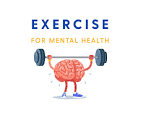The Connection Between Mental Health and Fitness
Physical fitness and mental health are intricately connected, with each influencing the other in profound ways. Engaging in regular exercise not only benefits your physical well-being but also plays a crucial role in maintaining good mental health.
Exercise has been shown to release endorphins, often referred to as ‘feel-good’ hormones, which can help reduce feelings of stress, anxiety, and depression. Regular physical activity can also improve sleep quality, boost self-esteem, and enhance cognitive function.
Moreover, incorporating fitness routines into your daily life can provide a sense of structure and accomplishment, which are essential for maintaining positive mental health. Setting achievable fitness goals and tracking your progress can instil a sense of purpose and motivation.
On the other hand, poor mental health can sometimes act as a barrier to maintaining a consistent exercise routine. Conditions such as depression or anxiety may make it challenging to find the motivation or energy to engage in physical activity. In such cases, seeking professional support and gradually introducing small steps towards fitness can be beneficial.
It is essential to recognise that mental health and fitness are not separate entities but interconnected aspects of overall well-being. By prioritising both physical exercise and mental well-being, individuals can create a harmonious balance that promotes holistic health.
7 Essential Tips for Enhancing Mental Health and Fitness
- Prioritize regular exercise to boost your mood and reduce stress.
- Practice mindfulness and meditation to improve mental clarity and focus.
- Ensure you get enough quality sleep to support your mental well-being.
- Maintain a balanced diet rich in nutrients to nourish both body and mind.
- Stay connected with friends and loved ones for emotional support.
- Set realistic goals and celebrate small achievements for a sense of accomplishment.
- Seek professional help if needed; therapy can provide valuable tools for managing mental health.
Prioritize regular exercise to boost your mood and reduce stress.
Prioritising regular exercise is a key tip for enhancing both mental health and physical well-being. Engaging in consistent physical activity not only helps to boost your mood by releasing endorphins but also plays a significant role in reducing stress levels. By making exercise a priority in your daily routine, you can experience the positive effects of improved mood and reduced stress, ultimately leading to a healthier and more balanced life.
Practice mindfulness and meditation to improve mental clarity and focus.
Practising mindfulness and meditation can be a powerful tool in enhancing mental clarity and focus. By dedicating time to quiet reflection and being fully present in the moment, individuals can cultivate a greater awareness of their thoughts and emotions. This practice can help reduce stress, improve concentration, and promote a sense of inner peace. Incorporating mindfulness and meditation into your daily routine can have profound effects on your mental well-being, allowing you to navigate life’s challenges with a clearer mind and a calmer perspective.
Ensure you get enough quality sleep to support your mental well-being.
A crucial tip for maintaining optimal mental health and fitness is to prioritise getting enough quality sleep. Adequate rest plays a fundamental role in supporting your mental well-being, as it allows your body and mind to recharge and rejuvenate. Quality sleep is essential for cognitive function, emotional regulation, and overall mood stability. By ensuring you get the recommended amount of restful sleep each night, you can enhance your resilience to stress, improve your concentration levels, and promote a positive mindset that contributes to both mental health and physical fitness.
Maintain a balanced diet rich in nutrients to nourish both body and mind.
Maintaining a balanced diet rich in nutrients is a fundamental tip for promoting mental health and fitness. A diet that provides essential vitamins, minerals, and macronutrients not only nourishes the body but also supports cognitive function and emotional well-being. Consuming a variety of whole foods such as fruits, vegetables, whole grains, lean proteins, and healthy fats can help regulate mood, energy levels, and overall mental clarity. By prioritising a nutrient-dense diet, individuals can fuel both their body and mind, enhancing their overall well-being and resilience against mental health challenges.
Stay connected with friends and loved ones for emotional support.
Staying connected with friends and loved ones is a valuable tip for maintaining good mental health and fitness. Building strong relationships and seeking emotional support from those close to us can provide a sense of belonging, reduce feelings of loneliness, and offer a safe space to share our thoughts and emotions. Engaging in meaningful conversations, sharing experiences, and receiving encouragement from our social circle can significantly impact our overall well-being, helping us navigate challenges more effectively and enhancing our resilience in the face of adversity. Remember, fostering connections with others is not only beneficial for our mental health but also contributes to a sense of community and support network that can positively impact our fitness journey.
Set realistic goals and celebrate small achievements for a sense of accomplishment.
Setting realistic goals and celebrating small achievements play a vital role in enhancing mental health and fitness. By establishing achievable targets, individuals can maintain motivation and focus on their progress. Recognising and celebrating even the smallest milestones can provide a sense of accomplishment, boosting self-esteem and instilling a positive mindset. This practice not only encourages consistency in fitness routines but also promotes mental well-being by fostering a sense of pride and satisfaction in one’s efforts.
Seek professional help if needed; therapy can provide valuable tools for managing mental health.
Seeking professional help when needed is a crucial step in prioritising mental health and fitness. Therapy offers valuable tools and strategies for managing and improving mental well-being. A trained therapist can provide guidance, support, and a safe space to explore and address underlying issues contributing to mental health challenges. By seeking therapy, individuals can gain insight, develop coping mechanisms, and learn effective strategies to enhance their overall mental health and well-being.

